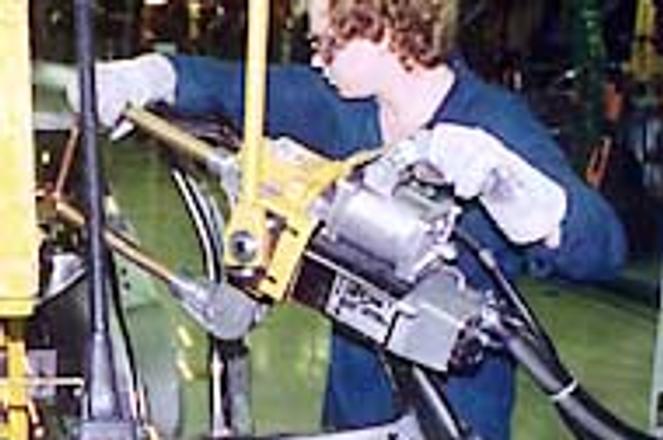EMPLOYMENT in Slovakia's automotive sector grew by 11 percent last year.photo: File photo
EVEN before ground has been broken on PSA Peugeot Citroen's planned car plant in Trnava, European and North American automotive suppliers are scouting locations across western Slovakia as the country's auto industry continues to blossom.
President Rudolf Schuster drew a number of investment pledges after meeting US auto industry officials in Detroit in mid-April, while Nitra mayor Ferdinand Vítek has said some 30 Peugeot suppliers have already inquired about setting up shop in his town, around 45 kilometres from Trnava and around 85 kilometres from Volkswagen's plant outside Bratislava.
"There is constant interest from large auto concerns, which are now concentrating on the area of eastern Europe, not only because there are cheaper resources, but also because there is a potential market there. It is reasonable to expect that further investors will have interest in the region," said Economy Minister Róbert Nemcsics.
On his recent state visit to the US, President Schuster met with auto-part manufacturers Visteon and Magna, both of which are exploring investment possibilities in central Europe. Schuster also met with officials from Delphi and Johnson Controls, both of which already supply Volkswagen and are looking to expand their Slovak operations.
"These companies employ 3,700 people in Slovakia, and after the production of Peugeot starts at its planned assembly plant, this number may increase to 6,000 or 7,000," said US ambassador to Slovakia Ronald Weiser, who accompanied Schuster on his trip.
Last year, members of the Slovak Car Industry Association (ZAP SR) employed over 60,000 people, 11 percent more than in the previous year. Once Peugeot's plant is online, it is expected to employ up to 4,000 people directly, while creating an additional 6,000 jobs in related industries.
"Visteon is the largest supplier for Peugeot worldwide. If Peugeot is going to grow, Visteon is going to branch out as well," said Weiser. The company has already announced plans to build a facility in a Visegrad Four country within the next two years.
The Economy Ministry is also reportedly in negotiations with a German firm on an investment into industrial glass production in the Záhorie region north of Bratislava. While declining to name the potential investor before a deal is arranged, Nemcsics did say the investment "should amount to around €500 million in the first phase."
The auto industry has become one of the pillars of Slovakia's economy, generating nearly 27 percent of the country's export earnings last year. For the last 12 years, Slovakia's auto production has centred on Volkswagen, which operates the huge Lozorno industrial park outside Bratislava, as well as facilities in central Slovakia's Martin.
Volkswagen's production in Slovakia has been steadily growing since 1992, and last year exceeded 225,000 vehicles, a 24 percent jump from 2001 (see chart, below). The manufacture of automotive components in Slovakia grew last year by 28 percent, to total Sk53.3 billion (€1.3 billion).
Already accounting for 20 percent of Slovakia's total industrial sales, the auto sector is set to grow even more rapidly on the back of Peugeot's planned factory, a €700 million investment slated to come online by 2006. Construction on the 196 hectare site outside Trnava is scheduled to begin in September and the company overseeing the plant's construction, Trnavainvest, has already begun acquiring the necessary property deeds.
Auto-industry officials and government representatives say the country has already come close to reaching development targets that had been set for 2010, and production and investment figures continue to outpace earlier predictions.
"There is a plan for the development of the auto industry till 2010, which speaks about production of somewhere between Sk160 and Sk200 billion (€3.9 and €4.9 billion) per year. Currently, this volume is around Sk185 billion (€4.5 billion), and we expect it to approach Sk200 billion this year," said Nemcsics.
Volkswagen and Peugeot are Europe's two largest carmakers. With a planned capacity of 300,000 new cars annually, Peugeot's plant means that Slovakia's overall annual auto production could triple by the end of the decade.
"Reaching [annual] production of 750,000 cars sometime in 2010 is not unrealistic," said ZAP head Jozef Uhrík at a February press conference.
Uhrík, also chairman of the board at Volkswagen Slovakia, added that Peugeot's investment will spur growth in Slovakia's industrial parks and drive output increases at the country's automotive suppliers.
"The entry of a new player in the area of manufacturing on the Slovak market will stimulate the development of the supplier network," said Uhrík.
"This year ZAP expects along with the increasing support of industrial parks, at least 20 percent further growth in the manufacture of components," he said.
Central Europe is becoming increasingly attractive to auto manufacturers seeking to take advantage of skilled labour forces in former socialist states, which cost a fraction of those in western Europe. In addition, the market for new cars has been growing steadily in former Warsaw Pact countries, despite remaining stagnant within many EU member states.
Industry experts predict car sales to double within the next five years in central and eastern Europe, even while falling in western Europe by as much as 3 percent for 2003.
One of the main reasons given by Peugeot for selecting Slovakia to host a new plant was its increasing turnover in central and eastern Europe. Peugeot's market share in the region has grown from 5 percent to 12 percent over the last five years.
"Auto manufacturers are going into non-traditional territories like central and eastern Europe, and the decision of Peugeot clearly fits into this strategy," said Uhrík.


